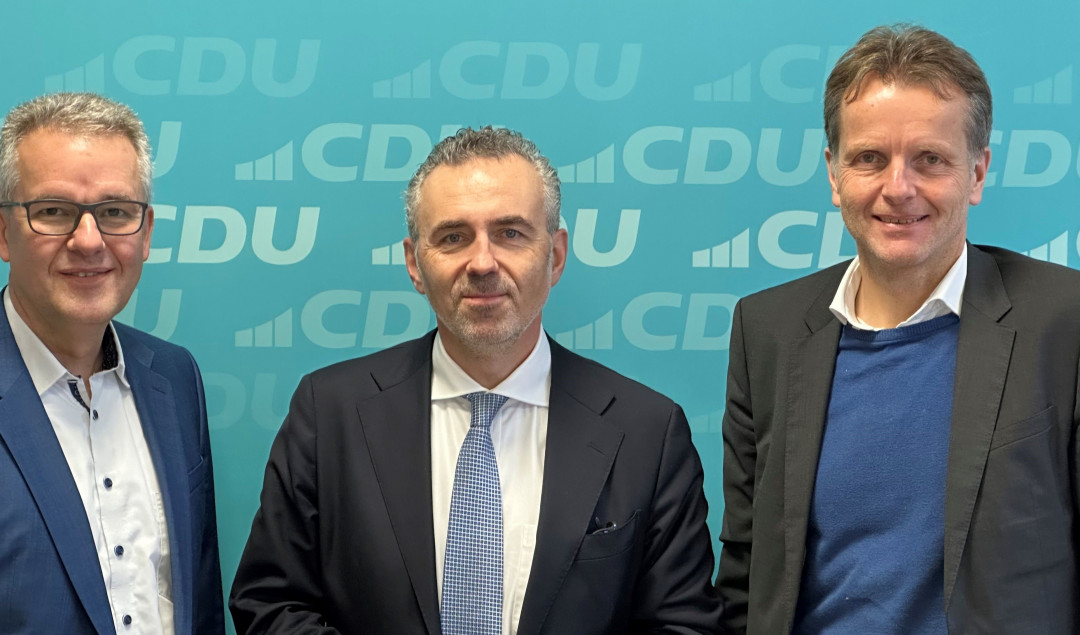
Strengthening the innovative power of German medium-sized companies and current federal research funding programmes for industry and research-related SMEs (small and medium-sized enterprises) were the focus of talks between Thomas Jarzombek, member of the Bundestag, and Jens Jerzembeck and Thomas Reiche, members of the board of AIF Allianz für Industrie und Forschung. The education and research policy spokesperson for the CDU/CSU parliamentary group in the Bundestag, as well as a member of the Bundestag's digital committee, and the AIF representatives exchanged views on 21 November 2024 at the CDU office in Jarzombek's constituency of Düsseldorf.
According to Reiche, the further development of the successful Central Innovation Programme for SMEs (ZIM) and the Industrial Collective Research (IGF), especially in times of drastic insolvency figures and economic downturns in Germany, plays an existential role for the competitiveness of the German economy nationally and worldwide. In this context, Jerzembeck drew attention to the current financing situation with regard to the outstanding federal budget negotiations: ‘ZIM and IGF have proven to be guarantors of success, especially in times of crisis. The planned 20 per cent cut in ZIM funding is by no means the right approach.’ In the current federal budget bill, only 502 million euros are set aside for the Central Innovation Programme for SMEs; in 2024, 628 million euros were still available for the ZIM. According to the 2025 federal budget bill, funding for the IGF programme will remain the same at 180.1 million euros, but rising costs and a higher administrative share are significantly affecting pure research funding.
Reiche continued, saying to Member of the Bundestag Thomas Jarzombek: ‘With an annual budget of one billion euros for the research funding programmes – ZIM 600 million euros, IGF 300 million euros and INNO-KOM 100 million euros – the government would be sending an important signal in terms of industrial policy.’ Jerzembeck is certain that this provision of funds will have a major leverage effect on companies, explaining: ‘For the state, this is an investment that will flow back many times over in the form of tax revenue alone.’
As an established and forward-looking industry network, the AIF is making clear demands of federal policy: ‘We expect a course to be set for Germany as a sustainable business location and thus the provision of sufficient funds for industrial research.’ Germany needs a strong industry – which also includes manufacturing SMEs. ‘If, in addition, the transformation process is to succeed and if Germany is to regain its position as a technology leader, research and development is the key,’ says Jerzembeck.
Both honorary AIF board members are also managing directors of research associations that provide competent and sustainable support to industrial and medium-sized companies in their commitment to innovation in cooperation with business and science. Reiche heads the FEhS - Institute for Building Materials Research e.V. and Jerzembeck heads the Research Association on Welding and Related Processes e.V. of the DVS.
Thomas Jarzombek, a member of the national executive boards of the CDU and the Mittelstands- und Wirtschaftsunion (MIT), values the decades of commitment shown by the AIF and has been advocating strong innovation funding for research-oriented companies in Germany for many years: ‘We need strong application-oriented and industry-related research in Germany in order to remain internationally competitive. We need to restore the successful research and innovation programmes of the federal government to their former strength. The period of planning uncertainty under the coalition of social democrats, liberals and greens must come to an end. We have to simplify access to these programmes for SMEs and reduce bureaucratic hurdles to an absolute minimum. In addition, applied and industry-related research institutions need more freedom. This applies in particular to the recruitment of skilled workers. I am committed to ending the current discrimination against non-profit research institutions as a result of the prohibition on improving their position as quickly as possible.’

